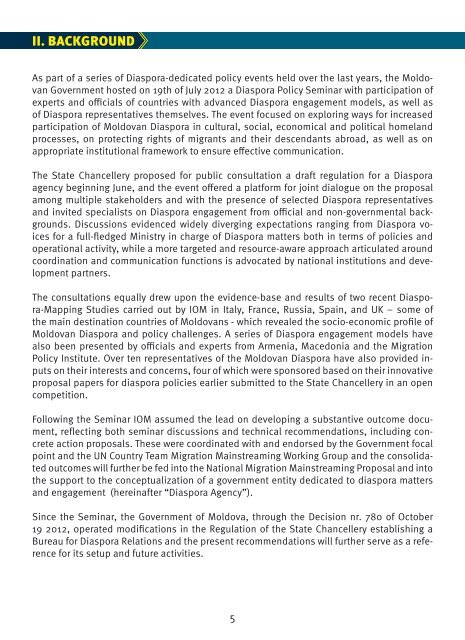English Version - Iom
English Version - Iom
English Version - Iom
Create successful ePaper yourself
Turn your PDF publications into a flip-book with our unique Google optimized e-Paper software.
II. BACKGROUND<br />
As part of a series of Diaspora-dedicated policy events held over the last years, the Moldovan<br />
Government hosted on 19th of July 2012 a Diaspora Policy Seminar with participation of<br />
experts and officials of countries with advanced Diaspora engagement models, as well as<br />
of Diaspora representatives themselves. The event focused on exploring ways for increased<br />
participation of Moldovan Diaspora in cultural, social, economical and political homeland<br />
processes, on protecting rights of migrants and their descendants abroad, as well as on<br />
appropriate institutional framework to ensure effective communication.<br />
The State Chancellery proposed for public consultation a draft regulation for a Diaspora<br />
agency beginning June, and the event offered a platform for joint dialogue on the proposal<br />
among multiple stakeholders and with the presence of selected Diaspora representatives<br />
and invited specialists on Diaspora engagement from official and non-governmental backgrounds.<br />
Discussions evidenced widely diverging expectations ranging from Diaspora voices<br />
for a full-fledged Ministry in charge of Diaspora matters both in terms of policies and<br />
operational activity, while a more targeted and resource-aware approach articulated around<br />
coordination and communication functions is advocated by national institutions and development<br />
partners.<br />
The consultations equally drew upon the evidence-base and results of two recent Diaspora-Mapping<br />
Studies carried out by IOM in Italy, France, Russia, Spain, and UK – some of<br />
the main destination countries of Moldovans - which revealed the socio-economic profile of<br />
Moldovan Diaspora and policy challenges. A series of Diaspora engagement models have<br />
also been presented by officials and experts from Armenia, Macedonia and the Migration<br />
Policy Institute. Over ten representatives of the Moldovan Diaspora have also provided inputs<br />
on their interests and concerns, four of which were sponsored based on their innovative<br />
proposal papers for diaspora policies earlier submitted to the State Chancellery in an open<br />
competition.<br />
Following the Seminar IOM assumed the lead on developing a substantive outcome document,<br />
reflecting both seminar discussions and technical recommendations, including concrete<br />
action proposals. These were coordinated with and endorsed by the Government focal<br />
point and the UN Country Team Migration Mainstreaming Working Group and the consolidated<br />
outcomes will further be fed into the National Migration Mainstreaming Proposal and into<br />
the support to the conceptualization of a government entity dedicated to diaspora matters<br />
and engagement (hereinafter “Diaspora Agency”).<br />
Since the Seminar, the Government of Moldova, through the Decision nr. 780 of October<br />
19 2012, operated modifications in the Regulation of the State Chancellery establishing a<br />
Bureau for Diaspora Relations and the present recommendations will further serve as a reference<br />
for its setup and future activities.<br />
5

















